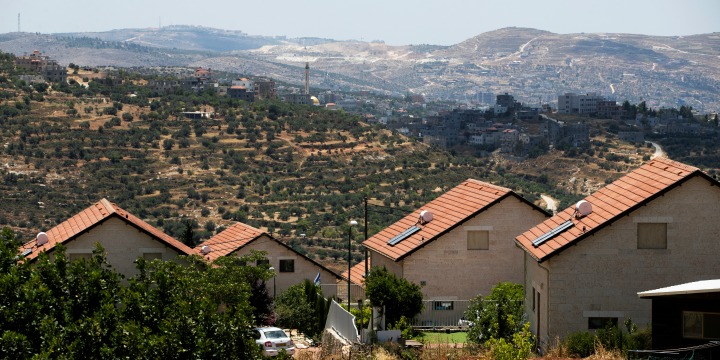
Houses are seen in the Israeli settlement of Itamar, near Nablus, in the West Bank, June 15, 2020. Photo: Reuters / Ronen Zvulun.
Historically speaking, both the “political” and the “practical” approaches to Zionism were necessary in the Jewish pursuit of national rebirth in the ancestral homeland — indeed, they complemented one another. Wherever the development of the Zionist enterprise was stymied on the political level, it continued in the practical sphere by creating facts on the ground. When the British abandoned the 1937 Peel Commission partition plan, David Ben-Gurion’s decisive consent to the proposal remained in place, and that became an advantage for him in the political sphere.
In the practical sphere, it was the swift construction of the “Tower and Stockade” villages that shaped the contours of the Jewish presence on the land, with an eye to the future. The practical approach was what ensured that the territory offered for the Jewish state by the 1947 UN partition resolution was much larger than the meager space allotted by the Peel Plan.
Ze’ev Jabotinsky, who worked mainly on the political level, expressed bafflement over the Tower and Stockade endeavor. He did not see how a number of dispersed, isolated villages could lead to a sufficient Jewish presence on the land in question. Ben-Gurion and Jabotinsky differed not only in the preference each gave to de facto versus de jure achievements, but also in their notions of what constituted a Jewish presence in a geographical space.
Whereas Jabotinsky measured such presence in terms of quantity and spatial continuity, Ben-Gurion viewed the spatial dimension in terms of the network of links that dynamically shaped it. This debate is fully relevant to Israel’s current need to renew the momentum of settlement in the West Bank.
President Trump’s proposal for a geographical division of the West Bank, though it is off the table for now, forces the Israeli leadership to acknowledge the struggle now being waged by the Palestinian Authority (PA) for predominance in Area C. It is now Palestinian Prime Minister (PM) Muhammad Shtayyeh who is most fully implementing the logic of practical Zionism. Indeed, the PA has already established irreversible facts on the ground. When Area C was demarcated in line with PM Rabin’s vision, it included about 60% of the West Bank. As a result of the spread of the Palestinian population, the territory has now shrunk by about a third. In a cabinet discussion on this issue a year ago, PM Netanyahu ordered that the Palestinian expansion be curbed. The IDF and the Civil Administration have other orders of priority, however, and are unable to carry out that imperative. The only approach that has a chance of success is the Zionist approach of Ben-Gurion: to give a green light to Israeli settlement of the key areas.
If the geographical space is to effectively be shaped in accordance with the map of Israeli interests, three initiatives will be required: 1) to establish a wide-ranging string of agricultural ranches, 2) to establish a new city in the heart of the Jordan Valley along the Allon Road in the Ma’ale Efraim-Gitit area, and 3) to build a new and advanced network of roads. This policy would also address Israel’s social and economic challenges by turning the potential for construction and settlement in the open land into an economic stimulus and a renewed and inspiring Zionist clarion call.
Maj. Gen. (res.) Gershon Hacohen is a senior research fellow at the Begin-Sadat Center for Strategic Studies. He served in the IDF for 42 years. He commanded troops in battles with Egypt and Syria. He was formerly a corps commander and commander of the IDF Military Colleges.
A version of this article was originally published by Israel Hayom and The BESA Center.


